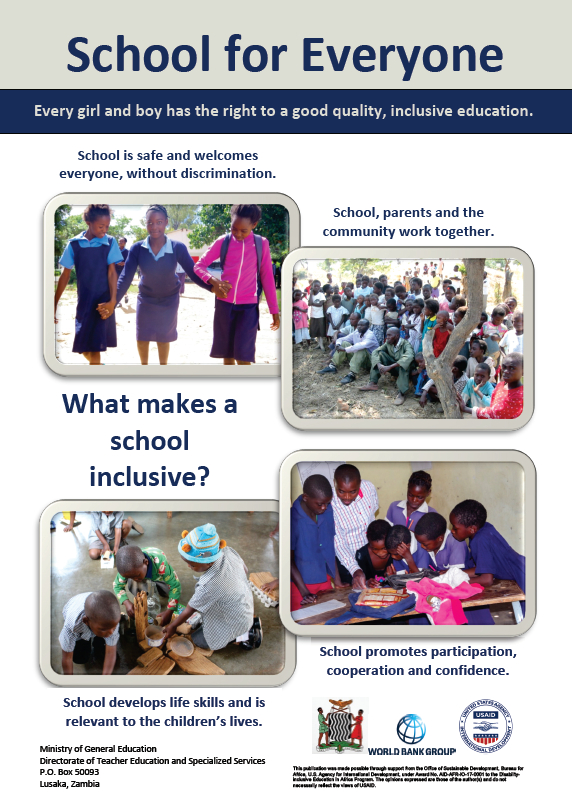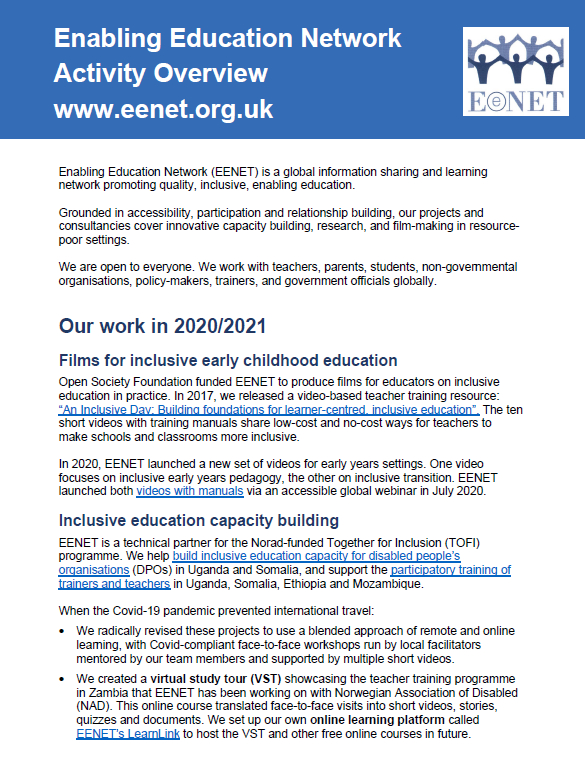This 8-hour course is provided by LEGO Foundation and INEE. It looks a learning through play in education in emergencies, why and how to implement it and the support needed. The course has been created in partnership with the LEGO Foundation and is part of the EiE Online learning series endorsed by INEE. It is currently available in English, with Arabic, French and Spanish versions coming soon.
Blog
***UKFIET conference 2021***
We are at the 16th International Education and Development UKFIET conference this week. The theme is: ‘Building Back Better in Education and Training: Reimagining, Reorienting and Redistributing’.
Usually, EENET has a stall at the conference in Oxford, UK. This year we have a stall in the virtual exhibition space. Helen, Ingrid and Su from EENET are taking shifts on the stall. Do pop along to say a virtual hello if you are attending the event. You can also find some key documents and videos on our virtual stall, and ask us questions or book a video call with us.
If you have not signed up to attend the conference, here is an Activity Overview flier we compiled for delegates, summarising some of EENET’s recent work and important reading materials.
** Deadline expired ** INEE Coordinator, Inclusive Education
Location: Home based.
Read the full vacancy details.
INEE is seeking a Coordinator for Inclusive Education who will be responsible for coordinating and strengthening INEE’s inclusive education initiatives for the network as well as supporting the activities of the INEE Inclusive Education Task Team (IETT).
New website from Norwegian Association of Disabled
NAD has launched a new website. It shares NAD’s work on inclusive education, human rights advocacy, economic empowerment, and disability-inclusive disaster risk reduction in Malawi, Palestine, Uganda, Zambia, and Zanzibar. You can also download training manuals on inclusive education, community based inclusive development training, and inclusive economic empowerment.
* They’re here! * Inclusive education teacher training modules now online
The inclusive education teacher training modules, developed by EENET and NAD in collaboration with trainers and teachers in Zambia, are now available to download from our website.
The modules are available under creative commons license. This means you are welcome to use the modules, and adapt them to your own needs and context.
The Zambia version has been approved by the Ministry of Education for use nationally. You can read more about the teacher training approach and how the modules were developed on our website. Contact us if you have any queries.
There are 11 modules available:
- Introduction to inclusive education;
- School inclusion teams;
- Identifying out-of-school children;
- Screening and identification of learning needs;
- Creating individual education plans;
- Exploring the role of a school inclusive education co-ordinator;
- Promoting active learning in the classroom;
- Developing learner participation;
- Including learners in transition;
- Including learners who have intellectual and/or development impairments;
- Making teaching and learning aids from locally available resources.
New items in EENET’s online library #2 (2021)
Another 8 documents have recently been added to our online library:
Disability-inclusive Child Safeguarding Guidelines PDF 3,6mb.
Disability-Inclusive Education in the occupied Palestinian territory (oPt): West Bank & Gaza PDF 454kb.
Girls’ education and child marriage PDF 3mb.
Review of UDL in Low- and Middle-Income Countries PDF 1,5mb.
Stemming Pandemic-Related Losses in Girls’ Education: Promising Practices from the AMPLIFY Collective PDF 12,8mb.
If you have any inclusive education documents that you would like us to add to our online library, please contact us.
Reflections on Covid response – StiR Education
STiR Education’s new paper shares experiences from its teams in India and Uganda. It describes how they have adapted their work during the Covid-19 pandemic, and used virtual approaches to support teachers.
New items in EENET’s online library #1 (2021)
In the last month we have added various new items to our online inclusive education library. These include:
An Introduction to Inclusive Education for Disabled People’s Organisations. Participants’ Handbook. PDF 2mb.
Deaf Education in the Global South (MESHGuide) HTML.
School for Everyone. Series of posters and leaflets.
Skills for Inclusive Facilitation (video).
If you have any inclusive education documents or videos that you would like us to add to the EENET online library, please contact us.
*NEW posters and leaflets * Supporting inclusive education awareness raising with community members, school leaders, and education managers and decision makers.
EENET worked with World Bank Zambia and the Zambian Ministry of Education Education (as part of a USAID-funded initiative) to develop a series of 3 posters. They contain key messages that you can use when working with stakeholders. The posters are available to download in A4 and A3 sizes from EENET’ website:
We also helped to develop a series of 3 leaflets. The leaflets are designed to be printed double-sided on A4 paper, then folded to A5.
You can download the leaflets from our website:
Leaflet for community members.
Leaflet for education managers.

INEE blog on the impact of bombing on education in Gaza
This new blog post by Ayman Qwaider highlights the situation of education following the latest bombing in Gaza. It reports on an INEE workshop with educators from Gaza. The blog also contains a hard-hitting timeline graphic showing the extent of the challenges and trauma that an average 14-year-old from Gaza has already experienced.

